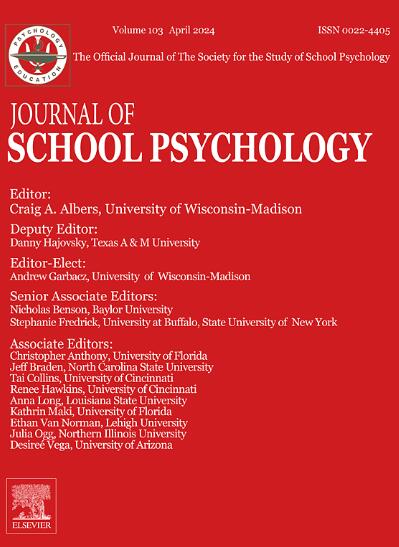Dependability of individualized Direct Behavior Rating Multi-Item Scales (DBR-MIS) for academic enablers
IF 4.1
1区 心理学
Q1 PSYCHOLOGY, SOCIAL
引用次数: 0
Abstract
The present study examined the dependability of three newly developed direct behavior rating multi-item scales (DBR-MIS) of academic enablers (i.e., academic engagement, interpersonal skills, and study skills). Twenty-two K–5 teachers completed all three 5-item DBR-MIS daily for 1 week for one student in their class. Teachers' ratings on each item during the first occasion were used to create individualized DBR scales with 1–4 items. Items with the lowest ratings (indicating least frequent academic enablers) were included first and subsequent items were added in ascending order. Dependability of both full DBR-MIS and individualized DBR scales was evaluated using generalizability theory. Results indicated that the full DBR-MIS demonstrated high dependability and required only 1–4 assessment occasions (i.e., < 10 as the criterion) to inform absolute decision-making for progress monitoring. The three- and four-item individualized DBR-MIS demonstrated comparable dependability to their respective full five-item DBR-MIS. Dependability estimates of individualized scales in general were higher than standard D study-derived estimates with the same number of items (i.e., dependability estimates obtained by manipulating the number of items from the full standard scales modeled in D studies). Results support continued investigation of the DBR-MIS as a viable progress monitoring tool for school-based applications. Further research and implications for practice were discussed.
针对学习促进因素的个性化直接行为分级多项目量表(DBR-MIS)的可信度
本研究考察了三个新开发的学业促进因素(即学业参与、人际交往技能和学习技能)直接行为评级多项目量表(DBR-MIS)的可靠性。22 名幼儿园至 5 年级的教师在一周内每天为班上的一名学生完成所有三个五项的 DBR-MIS 量表。教师在第一次评价中对每个项目的评分被用来创建个性化的 DBR 量表,其中包含 1-4 个项目。评分最低的项目(表示最不常用的学业促进因素)首先被纳入,随后的项目按升序添加。我们使用泛化理论对完整的 DBR-MIS 和个性化 DBR 量表的可靠性进行了评估。结果表明,完整的 DBR-MIS 具有很高的可信度,只需要 1-4 次评估(即以 10 次为标准)就能为进展监测的绝对决策提供信息。三项式和四项式个性化 DBR-MIS 与各自的五项式 DBR-MIS 具有相当的可信度。总体而言,个性化量表的可信度估计值要高于具有相同项目数的标准 D 研究估计值(即通过操纵 D 研究中模拟的完整标准量表的项目数而获得的可信度估计值)。研究结果支持继续对 DBR-MIS 进行研究,将其作为一种可行的进展监测工具用于校本应用。会议还讨论了进一步的研究和对实践的影响。
本文章由计算机程序翻译,如有差异,请以英文原文为准。
求助全文
约1分钟内获得全文
求助全文
来源期刊

Journal of School Psychology
PSYCHOLOGY, EDUCATIONAL-
CiteScore
6.70
自引率
8.00%
发文量
71
期刊介绍:
The Journal of School Psychology publishes original empirical articles and critical reviews of the literature on research and practices relevant to psychological and behavioral processes in school settings. JSP presents research on intervention mechanisms and approaches; schooling effects on the development of social, cognitive, mental-health, and achievement-related outcomes; assessment; and consultation. Submissions from a variety of disciplines are encouraged. All manuscripts are read by the Editor and one or more editorial consultants with the intent of providing appropriate and constructive written reviews.
 求助内容:
求助内容: 应助结果提醒方式:
应助结果提醒方式:


